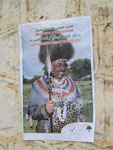
Amid mounting calls from opposition and international groups to slightly postpone Sudan’s elections next month, Sudanese President Omar al-Bashir issued a warning that proponents of the delay will be expelled from the country.
"We want them to observe the elections, but if they interfere in our affairs and demanded the delay, we will cut their fingers and put them under our shoes and expel them," Bashir said to supporters in remarks reported by the Associated Press.
The calls for a delay range from the Carter Center’s recommendation that the polls take place just 10 days later for logistical reasons (like making sure ballot papers printed abroad have arrived in Sudan), to opposition candidates warning that reforms necessary for holding free and fair elections have not been undertaken. A coalition of opposition groups yesterday demanded that the president postpone the elections to November.
The virulence of President Bashir’s response to suggestions that Sudan isn’t prepared for polls to open on April 11 is reminiscent of threats carried out against humanitarian aid organizations in Darfur last year. In retaliation for the International Criminal Court’s decision to issue an arrest warrant for President Bashir for crimes against humanity in Darfur last March, the government expelled 16 aid groups. The U.N. was forced to deploy emergency aid to meet the basic needs of an estimated one million people jeopardized by the expulsion.
It’s not difficult to imagine how (very) recent history could repeat itself.
Human Rights Watch this week enumerated some of the challenges to free and fair elections in Sudan, and while they stopped short of calling for a postponement, their list of recommendations is a sobering overview of the repressive, undemocratic, and at times violent tactics used by Sudan’s ruling party in Khartoum to silence opposition. HRW also documented moves by the South’s ruling party, the SPLM, to deploy security forces to intimidate journalists and opposition candidates.
Ultimately, with less than a month to go before polling is slated to begin, Human Rights Watch’s recommendation directed at international elections observers is a practical one: Monitor and publicly report on the political and human rights context in which the elections are taking place before and after the vote, and extensively consult with local civil society and all political parties.
Here is just one story from today that sheds light on the sort of human rights context that elections will soon take place in: Defying earlier U.N. condemnation, the Sudanese government bulldozed homes and small businesses in Soba al-Shahanat, a slum on the periphery of the capital that includes camps housing displaced people from marginalized parts of the country. Opposition candidates in Khartoum quickly responded, with an SPLM candidate for governor calling the action “barbaric.” A local candidate explained that the plan agreed upon with the government to eventually dismantle the camps had gone devastatingly awry:
"The agreement was that they were to prepare for us a different place with everything – infrastructure, streets, electricity, water – then they give us our land and five months to move … (But) until now they did not give us our land and as you can see – the fencing and destruction."
Photo: Election poster for Sudanese President Omar al-Bashir (Enough/Maggie Fick)

